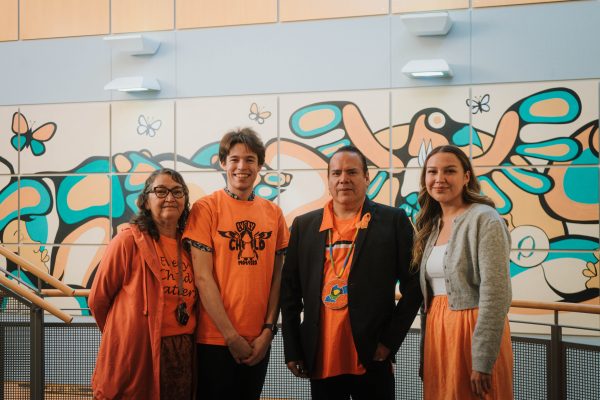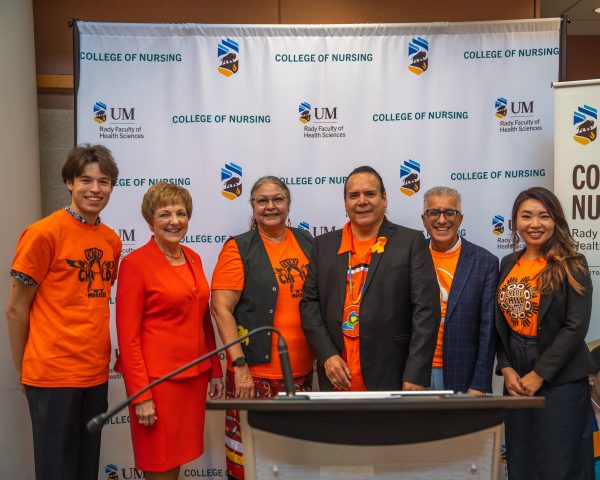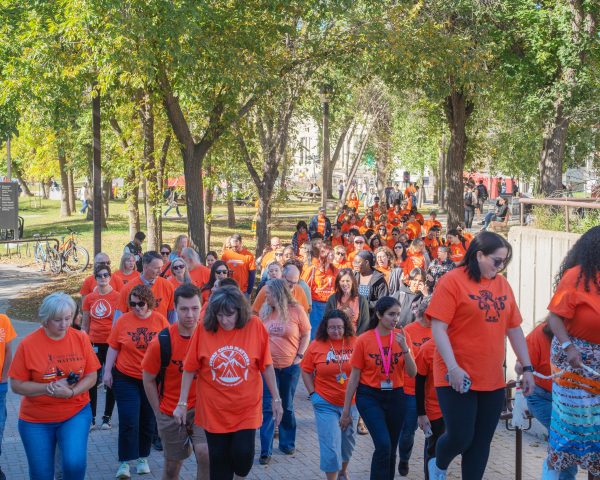The U of M Nursing Students’ Association (NSA) hosted the 10th annual Orange Shirt Day Walk on campus on Friday, Sept. 27 to honour children of the residential school system.
Orange Shirt Day originated in 2013 following inspiration from Phyllis Webstad (née Jack) who attended St. Joseph’s Mission Residential School from 1973-74 in British Columbia. Upon arriving at the residential school, Webstad wore an orange shirt from her grandmother — which was stripped from her and never given back.
Each year on Sept. 30, the National Day for Truth and Reconciliation, orange shirts are worn to honour survivors of residential schools and children who never returned home.
Judah Chepil, NSA senior stick, explained that the Orange Shirt Day Walk provides a forum to allow nursing students to learn more about Truth and Reconciliation. “Historically, a lot of Indigenous people face health disparities and fill our healthcare systems,” said Chepil. “It’s important that we are culturally aware and competent of the issues that they face so we can help dismantle some of the barriers that they face in healthcare.”
Kayleigh Pagee, NSA Indigenous student representative, hopes that the event serves as a step forward toward reconciliation. “It’s also for the community and the rest of the faculty to learn of the harms and the mistakes of the past and to make better choices in the future.”
In previous years, the Orange Shirt Day Walk led participants to the National Centre for Truth and Reconciliation on campus, said Chepil. Due to a growing number of participants, the walk was planned to circle the Administration Building and return to the starting point at the Helen Glass Centre for Nursing.

Speakers at the Orange Shirt Day Walk pictured in front of the new mural in the Helen Glass Centre for Nursing atrium. Karen Courchene, Grandmother in residence; Judah Chepil, NSA senior stick; Garrison Settee, Grand Chief of Manitoba Keewatinowi Okimakanak; and Kayleigh Pagee, NSA Indigenous student representative.
Several speeches were shared before the start of the annual walk.
“When I see you wearing that orange shirt, it fills my heart,” said Grandmother in residence Karen Courchene, who grew up in the shadow of residential schools. “You’re honouring my parents. You’re honouring my aunts and uncles. You’re honouring my siblings. You’re honouring my community. You’re honouring all those who were at the residential schools — all those who didn’t come home.”
Jennifer Chen, MLA for Fort Richmond, expressed her delight to have learned that the NSA received the Orange Shirt Day grant funding from the provincial government. Chen stated that, “on the path of Truth and Reconciliation, there will be generations that will carry the torch and continue on this path — we don’t just stop today.
“In December 2023, Manitoba established Orange Shirt Day as a provincial statutory holiday,” added Chen. “All Manitobans have the opportunity to reflect on the legacy of residential schools and the profound impacts of that trauma that still exist today.”
Michael Benarroch, U of M president and vice-chancellor, acknowledged that though we say “every child matters” — a message associated with Orange Shirt Day — there is still so much work to do to put that statement into action.
“It’s my hope as president that I can empower our community to continue to do the work that needs to be done,” said Benarroch. “To continue to move forward in a good way and to build better relationships, and I think every day we try to do that as an institution.”
Netha Dyck, dean of the college of nursing, stated that “today is not just a ceremony, it’s a day of reflection and commitment. We are here to remember the past, honour the survivors and dedicate ourselves to creating a future of reconciliation where every child matters.”
Dyck mentioned that 128 Indigenous students are in the bachelor of nursing program and receive academic, personal and cultural support through the program Mahkwa omushki kiim — a pathway to Indigenous nursing education.
“Let us not only honour the past, but also commit to being advocates for change,” said Dyck. “Together, we can ensure that ‘every child matters’ not only becomes a statement, but a guiding principle in everything we do.”

Judah Chepil (NSA senior stick), Netha Dyck (dean of the college of nursing), Brenda Longclaws (Knowledge Keeper in residence at the college of nursing), Garrison Settee (Grand Chief of Manitoba Keewatinowi Okimakanak), Michael Benarroch (university president and vice-chancellor) and Jennifer Chen (MLA for Fort Richmond).
Grand Chief Garrison Settee of Manitoba Keewatinowi Okimakanak shared that his relatives went to residential schools, but that “nobody ever talked about it.
“Many years passed, decades, even one hundred years — those stories were hidden, because they were too painful to talk about, too difficult to share and they carried that pain.
“But we’ve come a long way since then,” said Grand Chief Settee. “Today, the Indigenous people are rising up. We are reclaiming our identities. We are reclaiming our languages. We have reclaimed our ceremonies […] We are no longer subscribing to the ideologies that were conditioned into our people. We no longer subscribe to the oppression of our people.”
Grand Chief Settee concluded that “true reconciliation will not happen unless we do it together. True reconciliation will not happen unless there is action, and that’s what we’re doing here.”

Participants of the Orange Shirt Day Walk left the Helen Glass Centre for Nursing and returned following a circle around the Administration Building.

